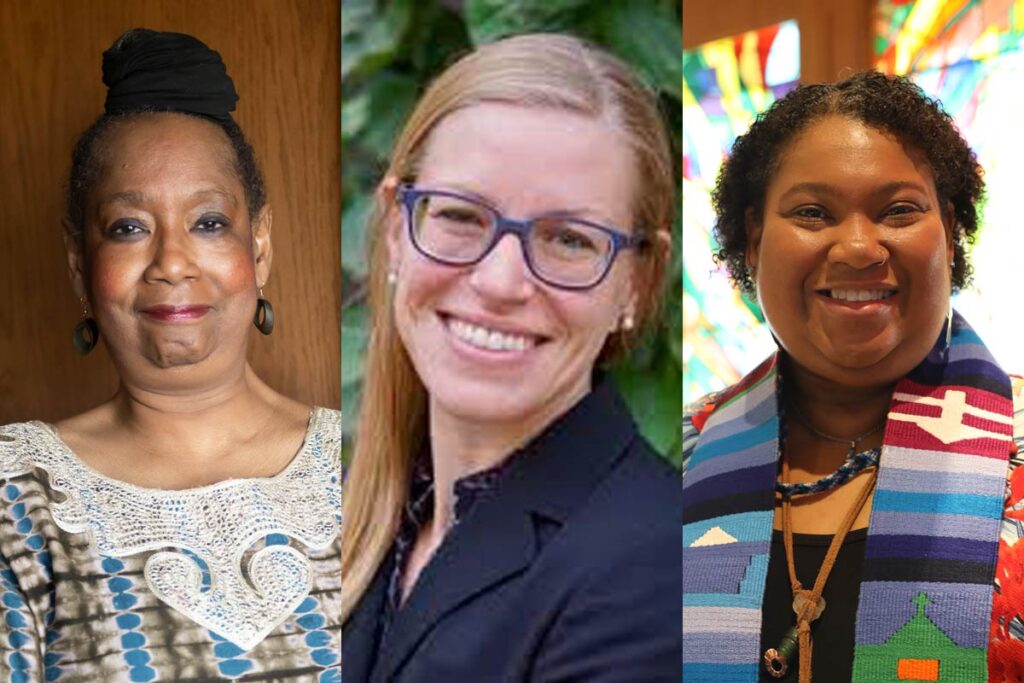Who We Were Then / Who We Are Now
Preserving our Values in Trying Times
By Rhiannon Koehler

At LSTC, we are committed to our role as a Christ-centered institution that is responsive to our context, committed to excellence, and committed to diversity, equity, inclusion, and justice. How do we continue to preserve our values in these trying times?
Luther scholars and academic leaders are among the best placed to answer this pressing question. In an era marked by uncertainty, it isn’t hyperbolic to identify this moment as key to the future of faith and practice in our country.
As Dr. Candace Kohli, Assistant Professor of Lutheran Systematic Theology and Global Lutheranism reminds us, “We have to engage the Lutheran heritage critically…so we have the ability to identify when and how those socially constructive processes are at work. If we engage the history only nostalgically, not only do we miss that social construction process, but we actually participate in it and perpetuate [those harms.]”
We may not be able to lean into the historical record for an unsullied hero of Lutheran tradition, but we can inject our values into our daily practices, as we have for centuries. Regardless of the ever-changing challenges we face in our evolving world, we can take daily action to ensure we are moving forward in alignment with our values. When other members of our greater community engage with us, it is in an arena of grace, understanding, and fairness, for we are a community that takes an unflinching look at our imperfect history and acknowledges our part in making our world what it is today.
Today, our institution remains committed to anti-racism, acknowledging our past and present imperfections, and defying those influences driven by divisiveness. As Min. Vimary “Vima” Couvertier-Cruz, Director of Diversity, Equity, Inclusion and Justice, says, “[We have an] imperative to acknowledge, to honor, to embrace, and to serve justice in love for all of God’s children in the wholeness, richness and complexities of who they are, honoring race, ethnicity, nationality, sex, gender, gender expression, abilities, age and/ or intersectionality.”Leaning into our values remains a significant commitment. And it is an ongoing practice.
As Couvertier-Cruz explains, “During these times of rapid changes and challenges, it is crucial that we listen to how the members of our community are experiencing the school in their daily lives. As members of this community, we are responsible for taking care of each other, particularly those who are more at the margins.”
So how do we do that? At LSTC, through our centers, initiatives, and faculty-led programming, we are committed to bringing opportunities for connection and engagement to our students, faculty, staff, and alums. We are intentionally oriented toward leadership, committed to principles that ultimately launch students toward careers making fundamental, actionable differences in the world. Dr. Thomas states, “LSTC’s curriculum connects theological subjects, such as biblical studies, constructive theology, Christian Ethics, theological intersectionality, church history, and Lutheran Confessions, to contemporary societal challenges. It incorporates discussions on social justice, sustainability, and congregational/community activism. This helps students see the relevance of their faith in addressing real-world issues, fostering a sense of responsibility.”
We celebrate our faculty, students, and staff for their work, and acknowledge that everyone has the opportunity to state who they are to the world in these times, and to do so loudly, publicly, and vulnerably.
This is how we live out our values. How are you living out yours?
Self-Check for Living Your Values
This checklist can be used as a guide in your daily practice to observe how you’re embodying your own values.
| Ask → | Go Deeper |
| Am I creating space for honest dialogue? | Do I actively listen to diverse perspectives and foster conversations across differences? |
| Am I accountable for my actions? | Have I set measurable goals for personal growth in areas like inclusion, equity, and justice? |
| Am I contributing to the global good? | Do I consider the global implications of my actions, such as their impact on climate, migration, or marginalized communities? |
| Am I cultivating authentic relationships? | Do I prioritize collaboration and mutual learning in my relationships? |
| Am I staying true to my core principles? | In moments of pressure, do I anchor my decisions in faith and integrity? |
| Am I investing in resilience and leadership development? | Do I take time to develop my skills and support others in their growth? |
| Am I engaging critically with my traditions? | Do I draw lessons from the past while adapting them to today’s challenges? |
| Am I hopeful and action-oriented? | Do I approach challenges with a belief in transformation and a commitment to positive action? |
Reflecting on these questions can help you ensure your values remain a guiding force, even in trying times.